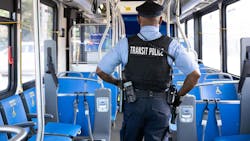Serious crimes continue to drop on SEPTA transit services
According to a new report from the Southeastern Pennsylvania Transportation Authority (SEPTA) Transit Police Department, serious crimes on the authority’s transit systems’ have continued to drop in most categories while enforcement of fare evasion, smoking and other quality-of-ride offenses increased significantly during the first half of 2025.
SEPTA notes the report follows a record-setting annual crime reduction of 33 percent in 2024, as SEPTA Transit Police have continued to implement new data-driven deployment strategies that have contributed to reductions in seven of eight categories over the first six months of 2025.
“We are continuing to see great results from the SEPTA Transit Police Department, thanks to efforts to bolster staffing and the implementation of innovative enforcement strategies,” said SEPTA General Manager Scott A. Sauer. “Despite an imminent fiscal crisis that could result in massive service cuts, we will continue to support the critical work that our police force does to ensure SEPTA is safe and secure for customers and employees.”
The authority notes that in addition to the progress on serious crimes, the focus on fare evasion and quality-of-ride offenses by the SEPTA Transit Police Department is also showing significant progress, as overall enforcement of these incidents increased by 27 percent compared to the first quarter of 2024.
For the first half of 2025, SEPTA Transit Police issued 4,366 citations for fare evasion, a 74 percent increase over the same six months in 2024. In addition, 1,189 tickets were issued for smoking – a six percent increase – and 253 for marijuana use, up 19 percent. According to the authority, reports by customers to the SEPTA Transit Watch App over fare evasion declined 46.7 percent and reports of smoking declined 13.6 percent.
“When we increase our enforcement of fare evasion, we consistently see lower rates of crime and disorder on the system,” said SEPTA Transit Police Chief Chuck Lawson. “We are committed to a three-pronged approach to combatting fare evasion through deterrence, enforcement and education.”
For deterrence, SEPTA says police will continue to enhance visible patrols and use new technology, including full-length fare gates that will soon begin expanding to nine additional stations. The first full-length gates at 69th St. Transportation Center have reduced fare evasion by approximately 20 percent. Enforcement includes regular patrols and using data to deploy officers to fare-evasion hot spots. The authority notes these efforts are complemented by educational efforts, such as recent fare enforcement blitzes at stations and on buses and new signage that clearly spells out the criminal penalties for fare evasion.
The full crime report is available on SEPTA’s website.
